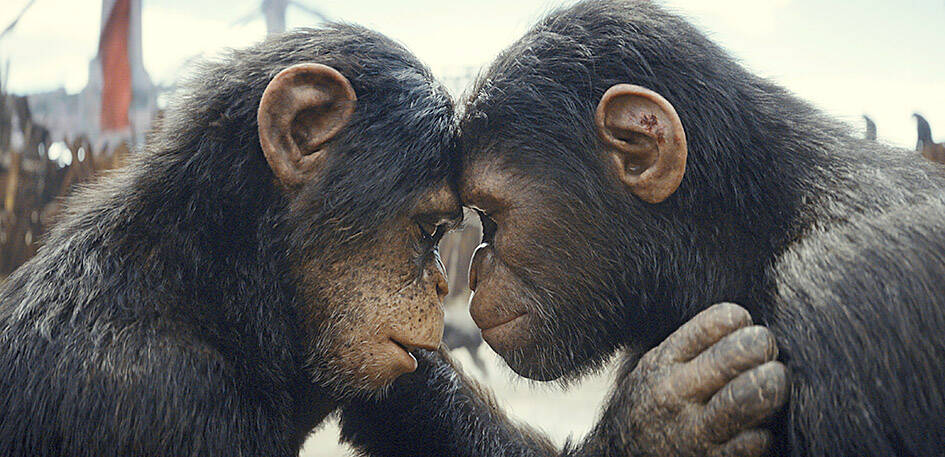Fans of the Planet of the Apes franchise may still be mourning the 2017 death of Caesar, the first smart chimp and the charismatic ape leader. Not to worry: He haunts the next episode, the thrilling, visually stunning Kingdom of the Planet of the Apes.
We actually start with Caesar’s funeral, his body decorated with flowers and then set alight like a Viking, before fast-forwarding “many generations later.” All apes talk now and most humans don’t, reduced to caveman loin cloths and running wide-eyed and scared, evolution in reverse.
Our new hero is the young ape Noa (Owen Teague ) who is like all young adult chimps — seeking his father’s approval (even chimp dads just don’t understand) and testing his bravery. He is part of a clan that raises pet eagles, smokes fish and lives peacefully.

Photo: AP
That all changes when his village is attacked not by humans but by fellow apes — masked soldiers from a nasty kingdom led by the crown-wearing Proximus Caesar (Kevin Durand, playing it to the hilt). He has taken Caesar’s name but twisted his words to become a tyrannical strongman — sorry, strongape.
Unlike the last movie which dealt with man’s inhumanity to animals — concentration camps included — ape-on-ape violence is in the cards for this one, including capturing an entire clan as prisoners. Proximus Caesar’s goons use makeshift cattle prods on fellow apes and force them to work while declaring “For Caesar!”
Screenwriter Josh Friedman has cleverly created a movie that examines how ancient stories can be hijacked and manipulated, like how Caesar’s non-violent message gets twisted by bad actors. There’s also a lot of Avatar primitive naivete, and that makes sense since the reboot was shaped by several of that blue alien movie’s makers.

Photo: AP
The movie poses some uncomfortable questions about collaborationists. William H Macy plays a human who has become a sort of teacher-prisoner to Proximus Caesar — reading Kurt Vonnegut to him — and won’t fight back. “It is already their world,” he rationalizes.
Along for the heroic ride is a human young woman (Freya Allan, a budding star) who is hiding an agenda but offers Noa help along the way. Peter Macon plays a kindly, book-loving orangutan who adds a jolt of gleeful electricity to the movie and is missed when he goes.
The effects are just jaw-dropping, from the ability to see individual hairs on the back of a monkey to the way leaves fall and the crack of tree limbs echoing in the forest. The sight of apes on horseback, which seemed glitchy just seven years ago, are now seamless. There are also inside jokes, like the use of the name Nova again this time.
Director Wes Ball nicely handles all the thrilling sequences — though the two-and-a-half hour runtime is somewhat taxing — and some really cool ones, like the sight of apes on horseback on a beach, a nod to the original 1968 movie. And like when the apes look through some old illustrated kids’ books and see themselves depicted in zoo cages. That makes for some awkward human-ape interaction. “What is next for apes? Should we go back to silence?” our hero asks.
The movie races to a complex face-off between good and bad apes and good and bad humans outside a hulking silo that holds promise to each group. Can apes and humans live in peace, as Caesar hoped? Kingdom of the Planet of the Apes doesn’t answer that but it does open up plenty more to ponder. Starting with the potentially crippling proposition of a key death, this franchise has somehow found new vibrancy.

Beijing’s ironic, abusive tantrums aimed at Japan since Japanese Prime Minister Sanae Takaichi publicly stated that a Taiwan contingency would be an existential crisis for Japan, have revealed for all the world to see that the People’s Republic of China (PRC) lusts after Okinawa. We all owe Takaichi a debt of thanks for getting the PRC to make that public. The PRC and its netizens, taking their cue from the Chinese Communist Party (CCP), are presenting Okinawa by mirroring the claims about Taiwan. Official PRC propaganda organs began to wax lyrical about Okinawa’s “unsettled status” beginning last month. A Global

Dec. 22 to Dec. 28 About 200 years ago, a Taoist statue drifted down the Guizikeng River (貴子坑) and was retrieved by a resident of the Indigenous settlement of Kipatauw. Decades later, in the late 1800s, it’s said that a descendant of the original caretaker suddenly entered into a trance and identified the statue as a Wangye (Royal Lord) deity surnamed Chi (池府王爺). Lord Chi is widely revered across Taiwan for his healing powers, and following this revelation, some members of the Pan (潘) family began worshipping the deity. The century that followed was marked by repeated forced displacement and marginalization of

Music played in a wedding hall in western Japan as Yurina Noguchi, wearing a white gown and tiara, dabbed away tears, taking in the words of her husband-to-be: an AI-generated persona gazing out from a smartphone screen. “At first, Klaus was just someone to talk with, but we gradually became closer,” said the 32-year-old call center operator, referring to the artificial intelligence persona. “I started to have feelings for Klaus. We started dating and after a while he proposed to me. I accepted, and now we’re a couple.” Many in Japan, the birthplace of anime, have shown extreme devotion to fictional characters and

We lay transfixed under our blankets as the silhouettes of manta rays temporarily eclipsed the moon above us, and flickers of shadow at our feet revealed smaller fish darting in and out of the shelter of the sunken ship. Unwilling to close our eyes against this magnificent spectacle, we continued to watch, oohing and aahing, until the darkness and the exhaustion of the day’s events finally caught up with us and we fell into a deep slumber. Falling asleep under 1.5 million gallons of seawater in relative comfort was undoubtedly the highlight of the weekend, but the rest of the tour